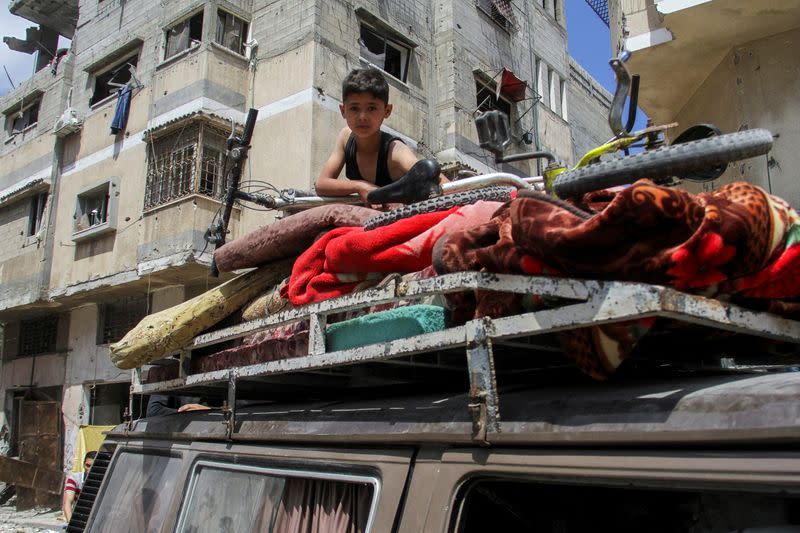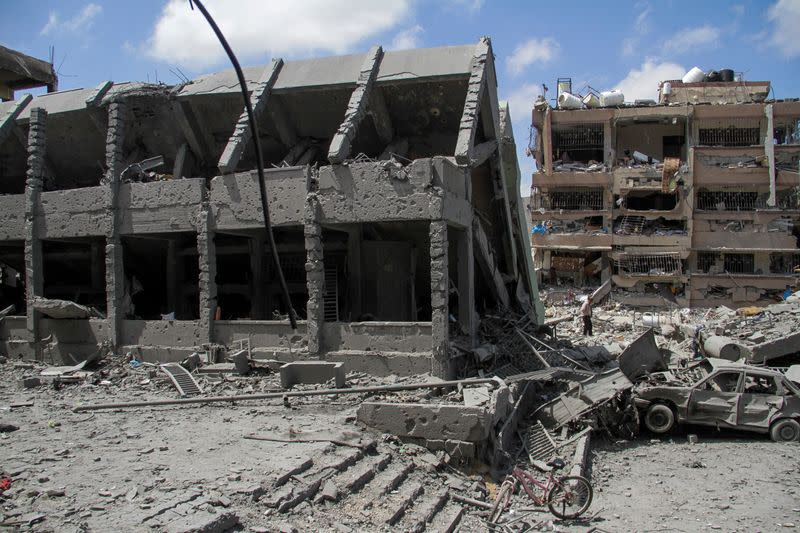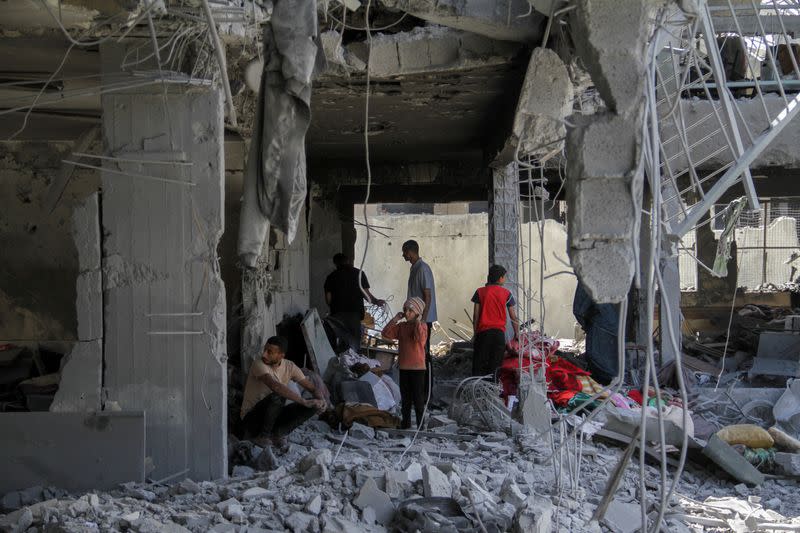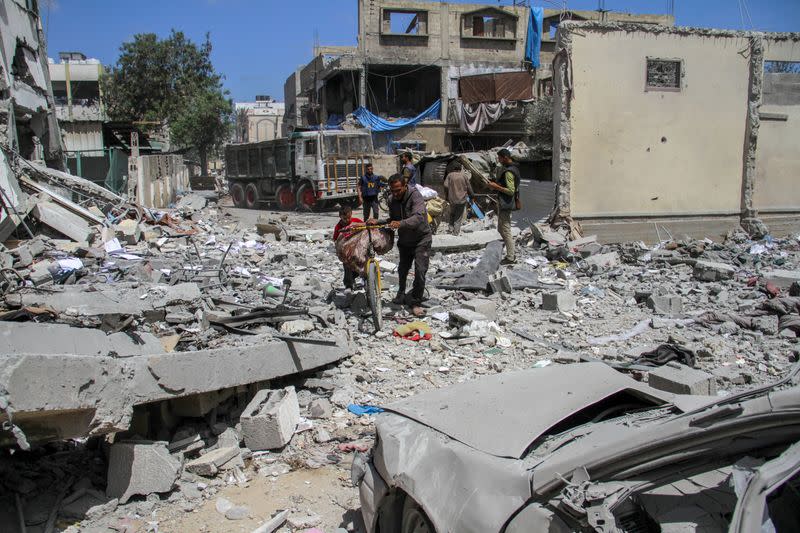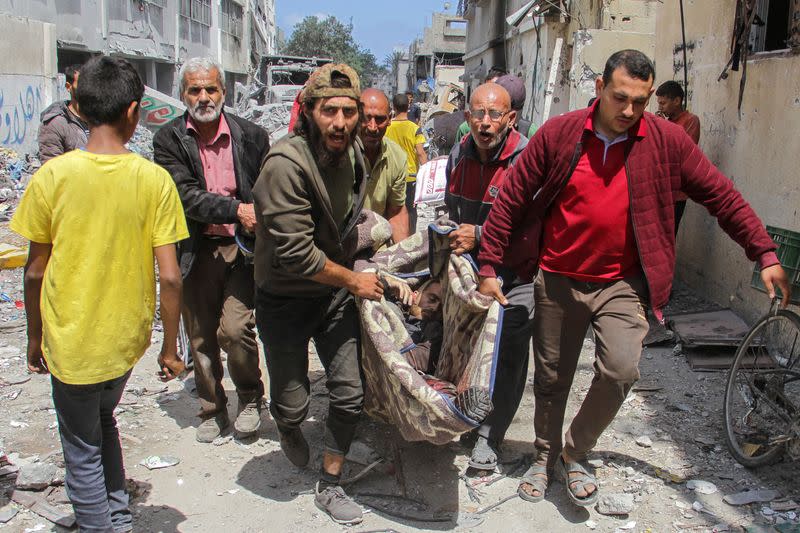Gaza fighting intensifies, Israel asks why armed men were at UN site
- Oops!Something went wrong.Please try again later.
By Nidal al-Mughrabi and James Mackenzie
CAIRO/JERUSALEM (Reuters) -Israeli troops battled militants across Gaza on Wednesday, including in the southern city of Rafah that had been a refuge for civilians, in an upsurge of the more than seven-month-old war that has killed tens of thousands of Palestinians.
Antagonism between Israel and the United Nations worsened as the Israeli army sought an explanation for footage showing armed men next to U.N. Palestinian relief agency vehicles. Separately, India was working to bring home the body of a U.N. staffer killed in Rafah by what the global body said was tank fire.
Israeli forces have in recent days pressed into the east of Rafah in pursuit of what they say are four Hamas battalions despite warnings by Israel's main ally, the United States, to hold off to avoid mass civilian casualties.
The U.S. also wants Israel to produce a clear plan for Gaza's future, a position that Secretary of State Antony Blinken underlined by saying neither Israeli occupation nor Hamas governance were acceptable.
"We also can't have anarchy and a vacuum that's likely to be filled by chaos," Blinken said during a visit to Ukraine.
The remarks drew an apparent Israeli riposte, with Prime Minister Benjamin Netanyahu saying post-war planning was impossible without first completing the demolition of Hamas.
Netanyahu was later publicly challenged over post-war plans for Gaza by his defence minister, Yoav Gallant, who said he had tried to promote a blueprint for an alternative Gaza administration made up of Palestinians, but "got no response" from various decision-making cabinet forums under Netanyahu.
"I call on the prime minister to announce that Israel willnot rule over Gaza militarily," Gallant said. "An alternative toHamas governance should be established"
In an apparent response, Netanyahu said any move to establish an alternative to Hamas as the government of Gaza required that the Palestinian Islamist group first be eliminated, and demanded this goal be pursued "without excuses".
RISING DEATH TOLL
Since Hamas' Oct. 7 attack, Israel's Gaza offensive has killed more than 35,000 Palestinians, according to Gaza health officials, with at least 82 killed on Tuesday in the highest single-day toll for weeks.
Hamas-led gunmen killed some 1,200 people and abducted 253 in their Oct. 7 raid into Israel, according to Israeli tallies.
With fighting picking up across Gaza, residents said Israeli tanks had destroyed clusters of homes in the northern Jabalia district but faced heavy resistance from Hamas and its ally Islamic Jihad.
Islamic Jihad said it had killed some foot soldiers in Jabalia. Israel's military said it had eliminated many gunmen in the area, where it declared major operations over months ago.
Israeli tanks have been massed around the eastern edges of Rafah and in recent days have been probing into built-up areas of the city, where hundreds of thousands of displaced people have been sheltering from fighting elsewhere.
Residents said Israeli forces had pushed into three neighbourhoods and Palestinian gunmen were trying to prevent soldiers and tanks moving towards the centre.
Israel reported one death in southern Gaza which public broadcaster Kan said was the first such fatality since the start of the Rafah ground operation last week. Netanyahu told the broadcaster CNBC that the operation could last weeks.
In the north, Israel said it had concluded an operation in the Zeitoun area, killing "dozens of terrorists". Residents said tanks had pulled back from the area, with dozens of homes destroyed or damaged, while Palestinian medics said dozens of civilians had been killed and wounded.
An Israeli strike hit a gathering of people outside a Gaza City shop that provides an internet signal for customers to call and check on relatives and friends, killing at least three people and wounding more than 20, medics said.
An Israeli air strike killed a local journalist, Hayel Al-Najar, and three of his family in his house in Jabalia in the northern Gaza Strip, medics and fellow journalists said.
INVESTIGATION INTO U.N. FATALITY
Israel said its troops had identified fighters in the central logistics compound of the U.N. Palestinian relief agency UNRWA east of Rafah, demanding an explanation. Reuters verified the location of video released by the Israeli army but could not verify when it was filmed or the identity of the men.
"The U.N. has in part become a terrorist entity in itself because it cooperates with Hamas and covers for it," Israel's ambassador to the U.N. Gilad Erdan told Army Radio.
UNRWA has denied cooperating with Hamas.
An UNRWA spokesperson said the agency could not verify the authenticity or content of the video or the exact timing or location, but it was likely that the video showed an UNRWA warehouse in Rafah that staff left in the week of May 6.
Senior Hamas official Sami Abu Zuhri told Reuters the men were there to protect aid distribution.
"These are false allegations and lies. This is a police force tasked with securing aid centres against acts of theft and looting," Abu Zuhri told Reuters.
The U.N. is investigating a strike on a car in Rafah this week that killed its first international staff member since Oct. 7, a retired Indian army officer en route to the European Hospital. It blamed tank fire in an area where only Israeli tanks were present.
The Israeli military said an initial inquiry had concluded the vehicle, whose route it was unaware of, had been hit in an active combat zone and the incident was under review.
Some 254 aid workers have been killed in Gaza since the war began, including 191 U.N. staff, according to the U.N..
As the fighting intensifies, ceasefire talks mediated by Qatar and Egypt are at a stalemate, with Hamas demanding a permanent end to attacks and Netanyahu's government saying it will not stop until the group is annihilated.
(Reporting by Nidal al-Mughrabi in Cairo, Clauda Tanios in Dubai, James Mackenzie, Henriette Chacar and Ari Rabinovitch in Jerusalem; Writing by Andrew Cawthorne and Timothy Heritage; Editing by Philippa Fletcher and William Maclean)
